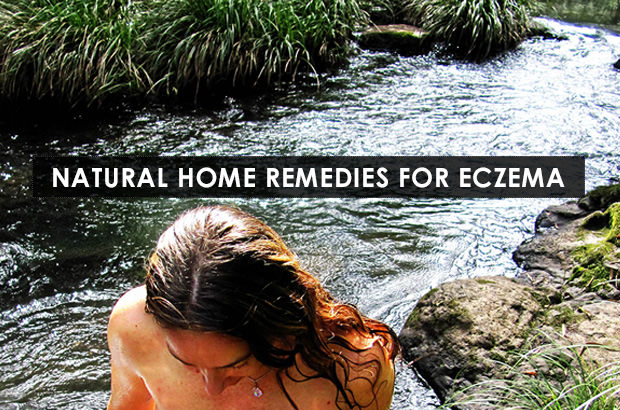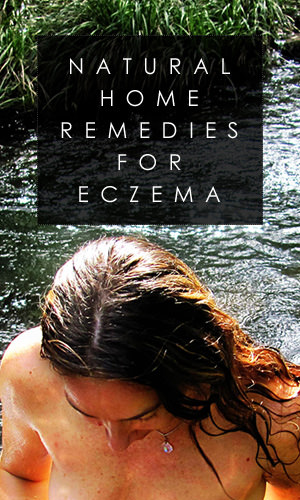
Natural Home Remedies For Eczema
Posted on 19 May, 2019

The word eczema comes from a Greek word ekzein, which means to effervesce or bubble or boil over. It describes the red, inflamed and very itchy rashes that one gets during an eczema flare up. Though eczema is not a life-threatening condition, it can be extremely unpleasant. The skin of the affected person becomes dry, itchy, reddened and cracked.
About 90 % of eczema patients are under age 5. Most infants who develop the condition outgrow it by their tenth birthday, while some continue to have symptoms on and off throughout life.
Generally, people with eczema suffer from dry, sensitive skin that itches. The itch may be so bad that you scratch your skin until it bleeds, which can make your rash even worse, leading to even more inflammation and itching. This is called the itch-scratch cycle.
The exact cause of eczema is still unknown. This disease appears to run in families with a history of allergies or asthma. People who live in developed countries or places with cold climates seem to be more prone to developing eczema. Certain foods can make eczema worse. Common ones include dairy products, nuts and shellfish. Allergens like pet hair, pet dander, mold and pollen also sometimes triggers eczema.
There is no cure for eczema for some. So instead of using harmful chemical creams, it is important that they manage their condition using natural methods that would not harm them in the long term.
Aloe Vera Gel

Aloe vera works to clear eczema in a few different ways. It moisturizes, which helps keep dry skin hydrated. Eczema is often exacerbated by dry skin, so anything that adds moisture will help to alleviate the redness and dry patches characteristic of eczema. Aloe vera encourages healthy skin growth, and it also acts as a protective barrier. Treating eczema with aloe vera is beneficial because it's an all-natural approach that doesn't require a prescription or even a visit to the doctor's office.
Coconut Oil

Coconut oil contains lauric acid, which is a rare type of fat found in coconut oil and mother’s breast milk. Studies have found that lauric acid has the ability to destroy microbes, making it effective treatment for itchy skin rash caused by bacteria, fungus and viruses.
For the oil to be most effective, seek out high quality organic cold pressed virgin coconut oil. The main reason for this is because all the nutrients, minerals and enzymes of the oil remain intact during the cold pressing process.This oil is more effective than the costly over the counter creams and lotions that you can buy for treating eczema.
Apply the oil evenly on your eczema patches and also on the dry areas of your skin. Leave it for 10 to 15 minutes to absorb.
Honey

Honey is an ancient remedy for the treatment of infected wounds, which has recently been ‘rediscovered’ by the medical profession, particularly where conventional modern therapeutic agents fail.
The healing property of honey is due to the fact that it offers antibacterial activity, maintains a moist wound condition, and its high viscosity helps to provide a protective barrier to prevent infection. The skin barrier is known to be much weaker in those with eczema, so we definitely need this extra barrier protection. Broken skin from scratching, dry, cracked skin, and red, open, oozing sores can all use a bit of healing.
Honey also retains moisture, which helps to combat the dryness, flaking and scaling.
To use honey against eczema, apply the honey directly onto the affected areas of the skin and then wash it off with warm water 10 minutes after.
Olive Oil

Olive oil has been used on skin dating back to ancient Greek civilizations. For those with eczema or extremely dry skin, this oil will penetrate deep into the epidermis to nourish and soften skin without any unnatural ingredients or allergens.
The compounds squalene and oleocanthal found in olive oil are known to have natural anti-inflammatory and antioxidant properties. When applied to the skin, these properties prove effective in healing the skin from conditions such as flakiness, dryness, itching and eczema. It also contains Vitamin E which may prove helpful as a natural cure for most skin conditions. As with the other oil treatments, let it soak for a bit before removing it with warm water.

Due to its cooling effect and rejuvenating properties, cucumber is sometimes referred to as the magic wand for your skin problems. Cucumber has antioxidants that help with the restoration of damaged skin, and its seeds are rich in vitamin E which helps keep skin cells hydrated and moisturized.
To apply, just cut the cucumber into thin round slices and place the fleshy area of the cucumber on the affected areas of the skin.
Chamomile

Traditionally, chamomile has been used for centuries as an anti-inflammatory, antioxidant, mild astringent and healing medicine. Studies have demonstrated that when applied, chamomile flavonoids and essential oils penetrate below the skin surface into the deeper skin layers. Add a few drops of pure chamomile oil extracts into a warm bath water and soak. You can also massage the chamomile oil directly on the affected areas of the skin.
Neem Extract

Indian Lilac, which is commonly known as neem, has been an integral part of Ayurveda for the benefits associated with it. It is has anti-inflammatory and analgesic properties which soothe the skin. You can boil neem bark in water and use its paste as a pack against eczema. You can also crush the neem leaves, extract the juice, and apply it to your skin.
An Oatmeal Bath

When everything else is failing, go back to the basics. A plain old oatmeal bath is great for moisturizing and soothing the skin. Chemical constituents in oatmeal have anti-inflammatory properties, which can help relieve discomfort brought on by inflammation associated with eczema. To use, pour some oatmeal into cheesecloth or muslin and tie it off securely into a little bundle. Dump it into your tub and run the bath until the water is milky and smooth. Soak for 10-15 minutes before getting out and pat gently dry with a clean towel.
Photo Credits
Books For Better Health

by John Berardi

by Deepak Chopra

by Dr. Christiane Northrup

by Mariza Snyder

 See Saw. You've been doing it all wrong.
See Saw. You've been doing it all wrong. Antioxidants - A Clear And Simple Explanation
Antioxidants - A Clear And Simple Explanation The Best Exercises For Carpal Tunnel Syndrome
The Best Exercises For Carpal Tunnel Syndrome 7 Ways Laughter Can Benefit Your Workout
7 Ways Laughter Can Benefit Your Workout










